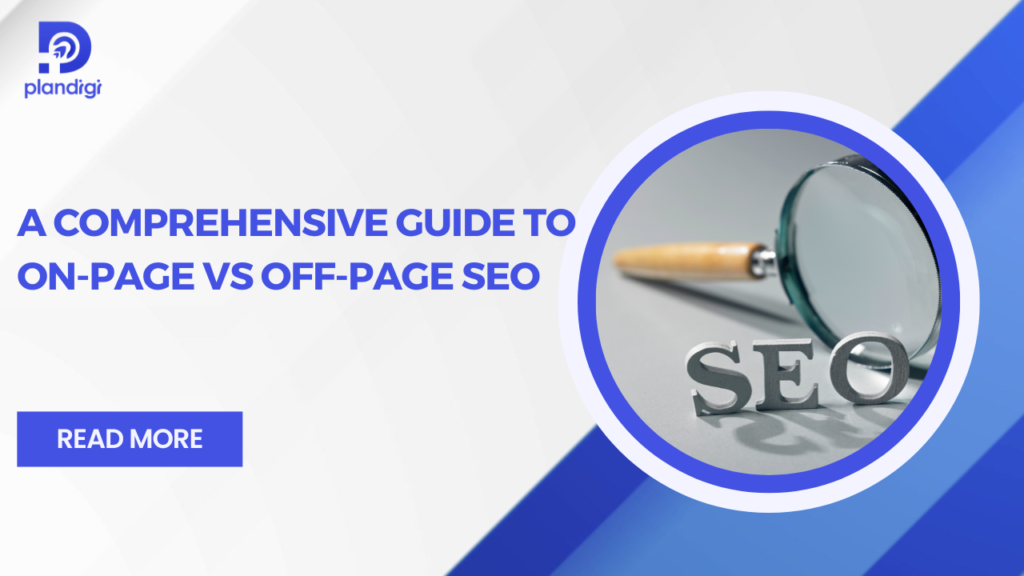Search Engine Optimization (SEO) is essential for improving website visibility and attracting organic traffic. Two primary aspects of SEO, On-Page SEO vs Off-Page SEO, play a critical role in this process. Understanding these concepts and their differences helps businesses optimize their websites effectively. Let’s break down these terms and explain how they work together to boost your site’s performance.
What is On-Page SEO?
On-Page SEO focuses on optimizing the elements of a website that you can control directly. It ensures that your site is user-friendly, informative, and aligned with search engine requirements. Key aspects of On-Page SEO include:
- Title Tags and Meta Descriptions
- These elements summarize your content for search engines and users. Including target keywords here improves rankings and click-through rates.
- Content Quality and Keyword Optimization
- High-quality content that answers users’ questions is vital. Proper use of keywords enhances relevance.
- URL Structure
- Simple, keyword-rich URLs help search engines understand your page’s topic.
- Internal Linking
- Linking related pages improves navigation and keeps visitors engaged.
- Image Optimization
- Compressed, alt-tagged images improve load times and accessibility.
- Mobile-Friendliness and Site Speed
- Ensuring your site is fast and mobile-responsive enhances user experience and search rankings.
What is Off-Page SEO?
Off-Page SEO focuses on activities that happen outside your website but still impact its authority and rankings. These activities signal to search engines that your site is trustworthy and relevant. Important aspects of Off-Page SEO include:
- Backlink Building
- Quality backlinks from reputable sites boost your website’s authority.
- Social Signals
- Social media shares, likes, and comments can indirectly influence rankings.
- Brand Mentions
- Mentions of your brand or website across the internet enhance credibility.
- Guest Posting
- Writing articles for other sites drives traffic and builds backlinks.
- Influencer Outreach
- Partnering with influencers helps promote your content and build relationships.
On-Page SEO vs Off-Page SEO: Key Differences
Understanding the Difference Between On-Page and Off-Page SEO is important for creating a balanced strategy. Here are some key distinctions:
- Control: On-Page SEO involves elements you can control directly, while Off-Page SEO relies on external factors.
- Focus: On-Page SEO improves content and technical aspects of your site. Off-Page SEO enhances your site’s authority through external validation.
- Impact: On-Page SEO affects user experience and relevance, whereas Off-Page SEO builds trust and authority.
How On-Page and Off-Page SEO Work Together
Both On-Page and Off-Page SEO are essential for a successful SEO strategy. On-Page SEO ensures that your website is optimized for search engines, while Off-Page SEO helps establish its authority. For example:
- Quality content (On-Page SEO) attracts backlinks (Off-Page SEO).
- Proper internal linking (On-Page SEO) enhances the value of external links (Off-Page SEO).
Balancing these strategies helps improve rankings and drive consistent traffic.
Tools for On-Page and Off-Page SEO
Several tools can simplify the process of managing On-Page SEO vs Off-Page SEO:
- On-Page SEO Tools: Yoast SEO, SEMrush, and Google Search Console.
- Off-Page SEO Tools: Ahrefs, Moz, and BuzzSumo.
These tools help track performance, identify opportunities, and refine strategies for better results.
Common Mistakes to Avoid
- Forgetting Mobile Optimization
- Many users access websites via mobile devices. A non-responsive site can harm rankings.
- Ignoring Meta Descriptions
- Missing or poorly written meta descriptions can lower click-through rates.
- Buying Backlinks
- Acquiring low-quality backlinks can lead to penalties from search engines.
- Overloading Keywords
- Stuffing keywords disrupts readability and can negatively impact rankings.
- Skipping Regular Updates
- Failing to update content and audit your SEO strategies can result in missed opportunities.
Final Thoughts
Balancing On-Page SEO vs Off-Page SEO is the key to improving your website’s search rankings and attracting organic traffic. While On-Page SEO ensures your website is optimized internally, Off-Page SEO focuses on building its authority externally. Understanding the Difference Between On-Page and Off-Page SEO allows you to create a robust strategy that drives results effectively.

